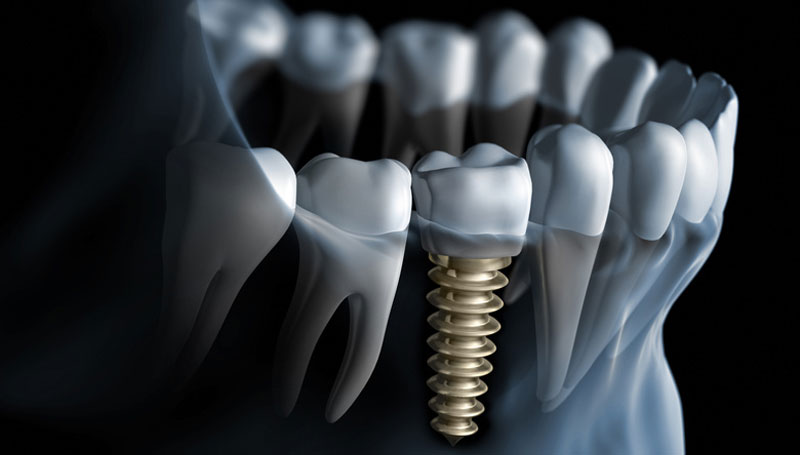One treatment for missing teeth that is increasingly in demand in the dental office is dental implants, as these allow patients to regain masticatory function while providing excellent esthetic results.
What are dental implants?
These are devices made of titanium metal whose shape resembles that of a screw (available in different sizes), and their main function is to replace the root of a lost tooth. These devices are fixed to the bone by means of a process called osseointegration, and once these are well positioned and adhered, a dental prosthesis is attached to them with the aim of replacing the entire lost tooth, that is, both its crown and its root.
The dental implant can be accompanied by the following types of prosthesis:
- Dental crown: If only one tooth is to be replaced.
- Fixed bridge: When 3 or 4 contiguous missing teeth are to be restored.
- Complete dentures: When all the teeth of a dental arch are to be restored.
This unit formed by the dental implant and the prosthesis is intended to restore the patient’s correct chewing function, oral health and, of course, the aesthetics of the smile, as it manages to reproduce the natural appearance of the teeth.
When are dental implants used?
Dental implants may be indicated when one or more teeth are missing due to causes such as:
- Very extensive cavity (whose only viable treatment was the extraction of the tooth due to the great loss of structure).
- Tooth loss due to advanced periodontal disease.
- Tooth loss due to trauma.
Provided that the quality of the alveolar bone allows it, a dentist can place up to 6 or 8 dental implants in the same arch.
Benefits of dental implants
- It offers excellent fixation properties to the bone, which ensures its stability in the mouth avoiding its displacement. In addition, it is adequately fixed to the prosthesis avoiding its mobility or misalignment and increasing the patient’s peace of mind and confidence, especially considering that some prostheses supported by mucosal tissue may suffer mobility.
- Restores masticatory and phonetic function, allowing the patient to eat and speak correctly.
- Good properties of durability and resistance over time.
- Prevents alveolar bone loss or, in case it already exists, prevents its progression.
- Prevents the migration of teeth into the edentulous spaces, which can cause crowding and malocclusions.
- Together with the prosthesis, it offers the patient excellent esthetic properties, recovering the harmony of the smile and imitating the color and shape of natural teeth.
Because of all the above benefits, it is no lie to say that dental implants greatly improve the quality of life of their wearers.
How is dental surgery performed?
The surgery for the placement of a dental implant is an intervention that, if performed by a dentist with the necessary knowledge and experience, should not involve major complications, and has an approximate duration of 30 to 40 minutes per implant.
Of course, it is important to mention that the duration of the surgery and its degree of complexity will vary from patient to patient. But in general it is an intervention with a fast recovery time if the patient follows the postoperative indications.
In order for the implant to be correctly placed in the alveolar bone, it is essential that there is a good quantity and quality of bone so as not to compromise the support and fixation. In case this is not the case, a bone graft can be performed before the implant placement, but it should be taken into account that it is necessary to wait a period of approximately 2 to 3 months after the graft placement to be able to place the implant.
In addition, in order to place an implant, the soft tissues must be completely healthy to avoid possible complications during healing and bacterial proliferation.
As mentioned above, implants attach directly to the surrounding bone, which is known as osseointegration. And once the implant has adhered well to the bone and the tissues have healed, the prosthesis can be placed over it. This process can take between 3 or 4 months.
Among the complications that can arise after implant surgery is peri-implantitis, which is a bacterial infection that affects the soft tissues surrounding the implant.
Important aspects to take into account
- Implants usually have a long life span, but for this to be possible the patient must follow postoperative indications to the letter so that all the tissues involved heal well and infection is avoided.
- It is also necessary for the patient to have a correct dental hygiene routine. Although they are not natural teeth, they also require care to prevent food debris from accumulating in the mouth which can cause inflammation and gum disease (this compromises the integrity of the implant).
- It is also important for the patient to visit the dentist periodically to check the correct functioning of the prosthesis and the implant.
Would you like to know more about our implant process, or other replacement options? Contact us to schedule an appointment today!

